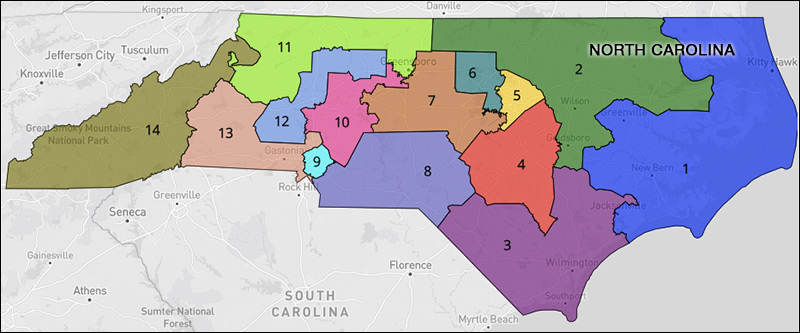By Jim Ellis
March 8, 2022 — The chaotic Tar Heel State political scene quelled on Friday as the postponed candidate filing period finally came to a close. Today we look at the recent North Carolina redistricting past and future, along with an analysis of the open Senate race. Tomorrow, we examine the state’s 14 new US House districts.
The North Carolina state Supreme Court’s approved map will be in place for the 2022 midterm election, and as a result the candidate slate is less competitive than the originally conceived congressional plan would have yielded. While the Democrats won this most recent political battle, the state’s redistricting war, a fight between the legislature and state Supreme Court that has resulted in four different congressional maps being in passed into law and ultimately rejected since 2010, will likely continue.
The Republican legislature controls the redistricting pen because the North Carolina governor, in this case Democrat Roy Cooper, has no veto power over this subject matter. Democrats control the state Supreme Court with a 4-3 partisan majority, but there is at least an even chance that the balance of power will change after the midterm election.
Two of the Democratic judges are on the ballot this year and no Republicans. One of the two, Justice Robin Hudson, is not seeking re-election, so GOP chances of winning at least one of the two races are enhanced. If they succeed, Republicans will hold the court majority after the first of the year.
Since a court map is only an interim plan, the legislature can replace it at any time. Since the state high court did approve the legislature’s latest version of the state House and Senate maps, Republicans stand a strong chance of maintaining their majorities in both houses. Therefore, re-drawing the congressional map in 2023 should the NC Supreme Court have a different complexion could mean that the GOP would be able to enact a stronger plan next year.
Originally, North Carolina arguably looked to be the Republicans’ most important redistricting state in that it was one of just two places where the party could gain multiple congressional seats and the only one where a potential three-seat increase was within the realm of possibility. The outlook for the final 2022 map, however, gives the Democrats an advantage. It now appears more likely that the Dems will gain one or even two seats in the delegation.
The North Carolina judicial decision is a major blow to House Republican national prospects. While the party still has a good chance of re-taking the majority they lost in the 2018 election, the difficulty factor has increased through adverse court decisions here and in several other states.
North Carolina is a runoff state, but a winner must clear only a 30 percent hurdle in the May 17 primary to avoid being forced into a secondary election. Thus, runoffs become rare. Any such subsequent election coming from the 2022 primary, however, will be settled in a vote on July 5.
There is no governor’s race or constitutional office on the ballot this year, so the open US Senate race leads the top of the ticket. Three-term Republican incumbent Richard Burr is retiring, thus yielding one of the most pivotal open Senate seat races in the nation.
Though 11 Democrat contenders filed for the Senate, the party already has a consensus candidate who is expected to breeze through the primary election. Former state Supreme Court Chief Justice Cheri Beasley, who lost her position in 2020 by a scant 401 votes statewide, is predicted to easily win the Democratic Senate nomination.
Therefore, the early action will be on the Republican side. Former Gov. Pat McCrory, who lost his 2016 re-election bid by less than a percentage point, returns to the statewide political wars. He is getting a spirited challenge from US Rep. Ted Budd (R-Advance), who carries former President Donald Trump’s endorsement. This is the battle to watch on election night. A third notable candidate, former Congressman Mark Walker, lags substantially behind.
The general election will begin with a toss-up rating, but Republicans tend to win more races in North Carolina than Democrats despite almost all competitive results being extremely close. If a “red wave” develops, as many observers believe, the eventual GOP nominee should have at least a slight edge going into November.

